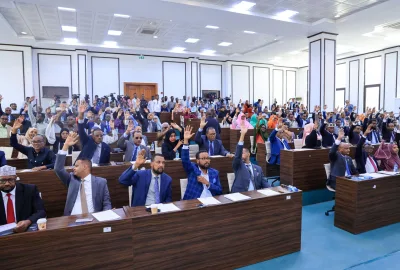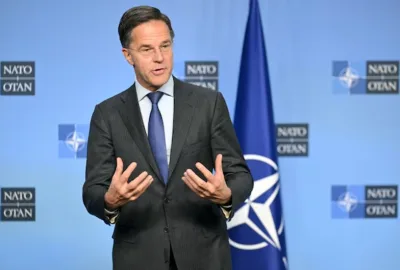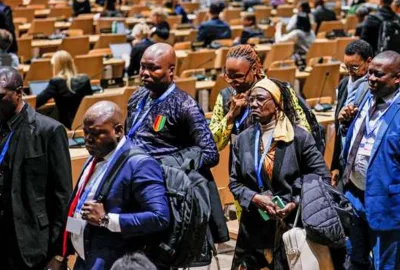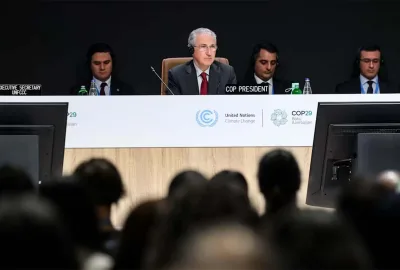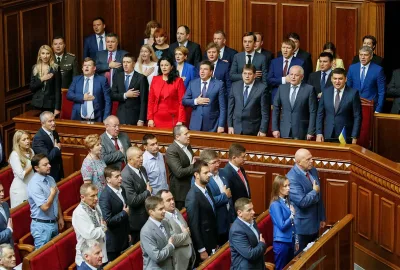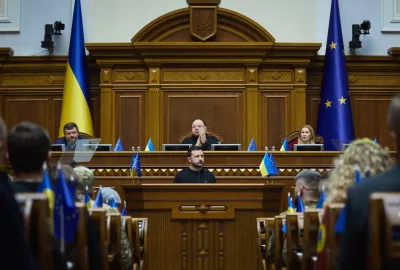No one can deny the huge progress that our beloved country is making, despite all the…
 No one can deny the huge progress that our beloved country is making, despite all the challenges that face us as a country and as a nation. This article aims to highlight the existing opportunities, as well as pointing out the challenges and more importantly the main aim is to suggest recommendations that are realistic and achievable to further develop the country. I will argue that there is an urgent need to review the mandate of the Federal Government of Somalia.
No one can deny the huge progress that our beloved country is making, despite all the challenges that face us as a country and as a nation. This article aims to highlight the existing opportunities, as well as pointing out the challenges and more importantly the main aim is to suggest recommendations that are realistic and achievable to further develop the country. I will argue that there is an urgent need to review the mandate of the Federal Government of Somalia.
I understand that some of our elites when they write in public they concentrate and highlight the weaknesses and the missed opportunities rather than inspiring our youths. It is easier to criticize and blame our leaders without proper justification, which kills the spirit, aspiration and the hope of our citizens.
On the 2nd of March 2015, Dr. Abdinur Sh Mohamud, the former Minister of Education and someone that I highly regard wrote an open letter to the President of Somalia indicating that he wrote the article ‘not as a critic’ but “out of concern for our country’s future” and continued to say that “clan-ism and warlord-ism is unabashedly on the rise”, with due respect I disagree with him on a number of reasons, which include his conclusion on the rise of clan-ism, lack of recommendations to the problems and lack of objectivity as he did not mention the progress that the country has made. I am not here to criticize my friend Abdinur, nor I do intend to defend the government, but I would like to be more objective by portraying our challenges, our successes as well as the bright future that is possible for our nation.
Not only do Abdinur but also other writers portray the country through the lens of criticism and pessimism, such as Ali Osman, who said that “the Somali government has not implemented a single initiative to fight corruption.” I have to disagree with such a basic presumption without the backing of any facts. Corruption is an anemic disease to the development of any country and the government has recognized this problem and a closer look at the Ministry of Finances website, http://www.mof.gov.so, one will see a number of initiatives that have been implemented and a result attracted the support of the World Bank, IMF and other donor communities.
I am optimistic about the future of Somalia and I have no doubt that if we all put together our efforts and show a unity of purpose we will bring peace and stability to Somalia, which is our top priority. The reasons that I am optimistic is that I have been in Somalia since 2008 and I can see the huge progress that the country is making on a daily basis in terms of security, provision of basic services, a booming economy, reconciliation, accountability and socio-economic and political development. Let me attempt to highlight some of these achievements:
Security:
- In 2009 I remember working in Mogadishu and the government controlled less than half of Mogadishu, let alone the other regions outside the city. Today, most of the regions are safe and secure and people can carry out their daily lives without any undue fear. Our soldiers are still out there at the fronts to complete their mission to secure all the remaining areas. It is time to acknowledge and praise our heroes. For the last two years alone many cities have been liberated and have started implementing the stabilization plan.
- Our security institutions have made significant reforms, as we can see security officers on the streets with professional attitudes. This came as a result of continual reforms in the security sector, which have included regular payments; additional resource allocation to security, and the commitment of our security forces.
- Our brave soldiers used to fight without regular payments as they were doing a solemn duty to their beloved country. But now they get regular payments which have certainly boosted their morale. Some times people criticize our soldiers, but what they often forget is that many young people have died for us and for our country in order to give us the environment that is conducive for business, children to go to schools, and for us to live a normal life. We are where we are because of the sacrifices that our soldiers have given. Let us not forget, that they are always working on a 24/7 basis to protect our many fronts. Have we ever thought to encourage them as citizens by visiting them, by providing incentives, by raising funds for them and by encouraging our youths to join them? Well that is what we need to do in order to realize our country’s vision.
- The Federal Government has not only won military victory but also successfully reached out to many al-Shabaab members and convinced them to join the peace process. There are centers of rehabilitation for these young people. Furthermore, high profile cases were also handled very well such as Sheikh Atom and Zakariya. As a result of the Federal Government’s efforts both of them have now been removed from the UN and US lists.
Political
- I know most of people talk about the political infighting and the time that is spent when the government changes, which are valid points, however, let us look at the positive side and the changes that have happened in the right direction.
- For the last two years we have seen a Somali led and owned process. When we look at our young institutions age, and how our parliament has solved all the political issues through democratic means, there is a lot to celebrate. I am not suggesting that the process was perfect, but both previous Prime Ministers opted out of resigning and gave parliament the right to decide on their mandate. This is a symbol of political and system maturity.
- We all agree that in 2014 there was huge progress as the cabinet redoubled its efforts to improve security (the indian ocean military operation), successful political outreaches to regions from MPs, ministers and leaders and in particular, the previous minister of Agriculture visited Janaale, Afgoye, Qoryoley, Balcad, Jowhar, Marka and other towns encouraging farmers to redouble their farming efforts and provided farming equipment’s and supplies. The recent change of bringing Omar Sharmarke as the new PM, has seen how our leaders are committed to a process of compromise and consultative process with the parliament, which is a positive sign of political maturity. Again, we have seen H.E. Abdulkadir Sheikh Ali Dini’s efforts of visiting Guricel, Dhusamareb and other areas in the central regions with his extremely powerful message of reconciliation. As a result of his visits we have seen how communities reconciled and come together to work for peace and stability. Also we have seen local institutions improving as we have witnessed the PM, MPs and ministers visiting Dhusamareb to advance the reconciliation process between communities. So, you can see that there are lots of positive progresses that we all need to celebrate and thank the government for instead of criticizing it without a shred of evidence to back it up.
- Despite all the challenges that have existed in Baidoa, we have now seen how President Sharif Hassan Sheikh Aden solved the dispute by bringing together all the sides including Madoobe Nuunow who is now the minister of Livestock of South West Administration.
- Thanks to President Hassan Sheikh Mohamud, for the first time Presidents of Puntland, Jubbaland and South West came to Mogadishu and had meetings to discuss the way forward. We have witnessed the establishment of a high level forum and their commitment to have regular meeting to discuss the future of Somalia. This is what you call Somali leadership and Somali ownership. After all, Somalia is for Somalis.
- Jubaland continues the reconciliation process and it is in the process of completing the governance structures by selecting MPs in a consultative and inclusive process.
- The Central regions reconciliation process is also underway with the aim of establishing a Federal Unit in central regions.
The above are some of the achievements in security and in politics that I believe deserve our collective recognition and appreciation, so that we can continue to advance these achievements. I know that this article will not give me the chance to mention all of the achievements, but my aim was to highlight some of them so that other people will also realize how far we have come and to build on what we have. The progress in Public Financial Management is also another area on which I can write a long essay based all the achievements that have been achieved. Those of us in Somalia can see it practically on how our Central Bank functions now compared to 5 years ago. I remember, when I was the Minister of Treasury, I vividly insisted that we promote and develop our central bank, as at the time our revenue collection was deposited in Dababshil accounts. I successfully implemented a mandate for all government revenue to be deposited in the Central Bank. As of now we have a functioning central bank with a board of governors and all civil servants and MPs have accounts with the central bank where they collect their salaries.
It is not only me who sees that Somalia is moving towards peace and stability. Nicholas Kay, the Special Representative of the Secretary General of the UN to Somalia in an interview on 6th February 2015 when answering the achievements of 2014 noted that, “in the last year, in 2014, in Somalia, I think there were two very significant developments. First, it made good progress in terms of becoming a federal State by establishing interim regional administrations in the south-west and in the south of the country. These are the building blocks of what will be the eventual federal Somalia. That was very encouraging. There’s more to be done in 2015 but that was good. The second, I think, was the security progress. Jointly, the African Union forces (AMISOM) together with the Somali national army made some good progress against Al-Shabaab. At least 16 important towns across the country were recovered from Al-Shabaab. Therefore, the map of Somalia is transforming and has transformed in 2014 towards a federal State under Government control and governmental authority.”
Also the UK Ambassador to Somalia, H.E. Neil Wigan published an article on 11 February 2015 and said “Much progress was made in 2014 as Somalia continued on the path to stability.”
Challenges
I strongly argue that the country is making huge progress, which we all need to recognize so that we can build on the success that already exists. Having said this, also the country faces huge challenges, which slow down the speed and the urgency needed to advance or build on the successes. So what are these challenges?
The main challenges that we face include lack of resources, security, a culture of impunity, lack of capacity, mistrust amongst people and institutions, dependency of foreign aid, and many more. So, why do we blame our leaders? When we very well know that these challenges prevent them from doing their mandated job?
No institution can function without adequate resources, yet we expect our leaders to do miracles without any resources. The Federal Government does not have enough resources to cover basic employee salaries let alone budgets for the running costs of various institutions. UNSOM, EU Somalia, AMISOM, AU, IGAD and other multinational offices working in Somalia have resources to run their offices including their diplomatic missions. I am not sure if they can survive for 3 months without a budget; this is the fundamental issue that all previous governments were seen as failing institutions. The current Federal Government also faces the same issues. I am not suggesting that this is an excuse for not doing anything, but just alerting us all as to the fact of the matter. The Federal Government needs 215 Million US dollars as a baseline budget for 2015. And this doesn’t include a budget for the reconciliation, stabilization, developments and other building vital organs of the institution. In September 2013, the International Community made pledges for around 2 billion Euros; however, no direct budgetary support reached the Federal Government accounts. The question therefore is why make pledges if you cannot fulfill your promises? Yes, it was political support, but this has created suspicion between the Federal Government and the Federal units in the country as they think that the money was given to the Federal Government. In addition, donor communities say over 60% of that money is allocated, which exasperates the problem.
The Way Forward
I strongly believe that Somalia is making huge progress that demands our appreciation. We need to recognize the fact that we are building out country and we need to believe that we can achieve our dreams. I know the road is long but by continuing our incremental progress, we can advance and build on the success that has already been achieved. Our institutions are not perfect, but finding solutions to the challenges is what we need to concentrate on more than blaming each other for no apparent reasons.
The Federal Government of Somalia has a mandate to hold fair and free elections by September 2016. We all know that it is impossible to accomplish this mandate within the remaining18 months, therefore, why on earth do we all expect miracles to happen? It was absolutely right in 2012 to have an ambitious target, but since we have progressed over the last 2 years we should be in a position to review and evaluate how this ambitious target can be achieved. The reason that I advocate or suggest the review of the mandate is that I want all of us to be more realistic and objective in order to build the confidence and the hope of our society. In order for any target to be met, the objectives have to be Specific, Measurable, Achievable, Realistic and Time bound (SMART). Therefore, the current mandate of holding fair and free elections in September 2016 is not realistic and it cannot be achieved and that is why we need to review it.
There is a new cabinet in place, and one would hope that their immediate task should be to review if we can achieve the mandate of vision 2016? In order to achieve vision 2016, we need to review the constitution, implement federalism and start a democratization process. The review of the constitution requires resources to hold civic education, public awareness campaigns, community engagement, and experts that can look at the best interests of our people. To implement Federalism, again you need resources, time to heal the wounds in communities, reconciliation, a bottom up approach, consultation and inclusivity and more importantly an environment that is conducive to all these activities. And to start a democratization process you need governance structures in place in all districts and rural areas, security, a stable society, reconciliation, civic education, public awareness campaigns, community engagements, and many more initiatives. All of these need resources, security and an environment that is conducive to implement these grand plans
Recommendation:
In conclusion, we urgently need to recognize the huge progress that Somalia is making in order for us to build on these successes until we reach a stage where it’s possible to hold free and fair elections. I strongly believe that it can be done, however, it needs and it demands a realistic plan that is achievable and that is why I suggest a review of the current mandate of vision 2016. The constitution can be reviewed and finalized, however, it is impossible to hold a national referendum. Interim Federal Units can be implemented but by rushing to do it, we would risk ignoring the legitimacy of the people. The process of democratization can be immediately started in some regions by choosing or selecting local councilors, but most regions do not have the environment that is conducive for a democratization process. All in all, fair and free elections cannot take place in 2016. Therefore, I would highly recommend the following:
- The cabinet should review the mandate and present to the public the available options;
- To hold an inclusive National consultation conference with all stakeholders represented to debate and discuss the available options;
- May be before the national conference as stated above, to hold regional conferences that can debate and discuss the options. Some regions could decide to hold fair and free elections while others may decide on other options.
- Parliament and the cabinet should debate and discuss the outcomes of regional and national conferences on reviewing the mandate of the government.
Depending on the progress of key issues, possible options or outcomes, there could be an extension of 12-18 months provided that the constitution is completed, the country is ready to hold a referendum, all interim federal units are in place, and all regions are peace and stabile, then there is a hope to achieve the mandate with an extension of up to 18 months. Another option could be a 2 – 3 years extension of the parliament and an election of leaders. The third option could be as Kamal Hassan Dahir suggested in his article entitled “Somalia Moving Forward: An Alternative Path for Vision 2016” where he suggests indirect election by bringing 1100 constituency members from each district, serving as an electoral college.
Finally, this article seeks to provoke discussions, debates and a deeper understanding of our future based on our past. I know that I don’t have all the answers but if we continue the debate and the discussion I am sure that we will find a common ground and solutions that are realistic and achievable. We all know that there is no silver bullet that can solve all our issues. I would hugely welcome criticism and feedback on this article, but please remember that we are talking about our country’s future. Somalia is for Somalis and Somalis are for Somalia.
By Abdirahman Omar Osman (Eng. Yarisow)
Former Minister & former Senior Advisor & Government Spokesperson
engabdirahman@gmail.com


